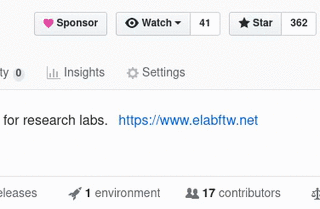A free, modern, versatile, secure electronic lab notebook for researchers
eLabFTW is an electronic lab notebook manager for research teams.
It lets you store and organize your research experiments easily. It also features a database where any kind of objects (such as antibodies, plasmids, cell lines, boxes, etc.) can be stored. It is accessed via the browser. Several research teams can be hosted on the same installation. This means eLabFTW can be installed at the institute level and host all team members at the same place. This is what is done at in many research institutions around the globe. It is also a great solution for companies looking into improving the traceability and reproducibility of their processes.
- Lab notebook for experiments
- Database for lab reagents, equipment, storage, cell lines, etc...
- Trusted timestamping
- Blockchain timestamping
- Import and export in various formats
- Calendar to manage booking of equipment
- Support for various scientific file formats
- Molecule/equation editor
- LaTeX support
- Todolist
- Public REST API
- Available in 17 languages
- Advanced permissions system
- Audited, secure codebase suitable for sensitive research results
eLabFTW is designed to be installed on a server, and people from the team can log in from their browser.
eLabFTW can easily be installed on any GNU/Linux server. It requires at least 512 MB of RAM (1 GB recommended) and 300 MB of disk space. Installation is done through Docker, so Docker needs to be installed on the server. Since it runs in a Docker container, php, webservers or mysql do not have to be installed on your server. Everything is provided by the containers so different versions and extensions do not matter. This makes upgrading versions much easier.
The documentation explains everything:
eLabFTW is a collaborative project. Your contributions are very welcome! Have a look at the contributing page to see how you can help with translation or code.
See SECURITY.md.
Free support is available through GitHub issues. Please open an issue if you have a problem, want to make a suggestion, ask a question or discuss a feature.
You can also join the chat room on Gitter.
PRO support and professional hosting are available from Deltablot.
Subscribe to the newsletter to be notified when a new release is out!
Or use GitHub to follow releases:
eLabFTW is distributed without charge. If you find this project useful, please consider making a small donation either:
-
as a GitHub Sponsor
-
or with Liberapay
This project is backed by Deltablot company.
- Atelier de la donnée ADOC Lorraine (projet financé avec le soutien du Fonds national pour la Science ouverte)
- Department for the Development of Innovative Digital Use – French National Research Institute for Sustainable Development
- Institut Curie – Centre de Recherche
- Vrije Universiteit Brussel
- Institute of Medical Biometry and Statistics, Faculty of Medicine and Medical Center – University of Freiburg, Germany
- elabftw/elabapi-python: python library for interacting with APIv2
- elabftw/elabapy: python library for interacting with APIv1 (deprecated)
- elabftw/elabapi-javascript-example: example code for interacting with APIv2 through JavaScript
- The ELN Consortium: a consortium of ELN vendors interested in improving interoperability between ELNs
These projects were created by users of eLabFTW, check them out if interested!
- din14970/elabftwqrprint: python library to print QR codes from database objects
- shabihsherjeel/nionswift_elabftw_plugin: python plugin for Nionswift
- iam-cms/elabapy-cli: command line interface for eLabFTW API
- Elab::Client: perl module for eLab API by Andreas K. Hüttel
- LabView client: LabView client library by @plasmapper
- Matlab client: Matlab package to facilitate working with eLabFTW API
- elabftw-teamupload: Synchronize teamgroups and teams with users from Excel
Thank you for using eLabFTW. I hope it will bring happiness to your lab ;)













